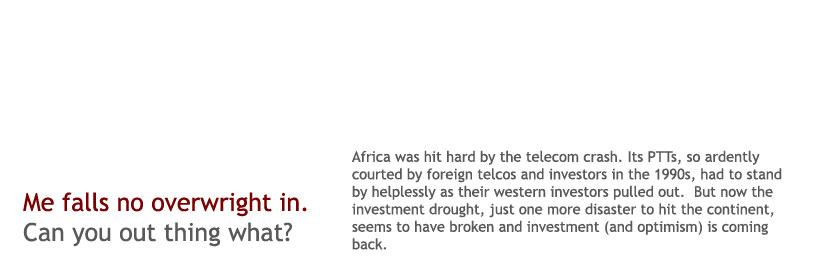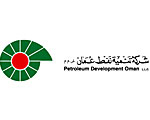
In the telecom sector, Africa ‘as a whole’ and Africa ‘up-close’ are different things entirely. On the one hand Africa as a whole has the world’s lowest tele-density (there is less than one telephone for every 100 people); on the other it has specific mobile communications markets, ably assisted by Siemens, which are growing at the fastest rate in the world.
Africa ‘as a whole’ is characterised by patchy and under-invested data networking infrastructure, but one operator in Africa, again with Siemens’ involvement, has implemented a next generation Multi-Protocol Label Switching (MPLS) network, well ahead of many operators in Europe. It’s this sheer diversity and apparent contradiction which fascinates those who find themselves working in Africa, none more so than the Siemens Belgium management team.
Due mostly to historic colonial links, Siemens Belgium undertakes a special lead role on behalf of Siemens in different parts of Africa and finds itself responsible for overlapping territories in each of the three communications divisions: Fixed, Mobile and Enterprise. In the Enterprise market it is responsible for all of Africa and the Middle East with the Exception of Turkey and South Africa; for fixed networks it services 22 countries in West and Central Africa and for Mobile it covers almost the same number.
Ben Hayen, Siemens’ director for fixed networks in Africa, agrees that the continent has its problems. But, he points out that in telecoms at least, Africa is beginning to pull together. In fact, he says, there are signs of a renaissance in enthusiasm for telecoms not seen since the glory days of the late 1990s when funds (or at least the promise of funds) poured in. When famine struck the global telecom sector in 2001 those funds dried up. Now they’re starting to come back, but this time they’re often being generated from within the region itself.
“You could say that Africa was not directly affected by the 2001 downturn in the telecom market,” said Hayen. “But where you did see significant impact was where many of the European and Asian PTTs, and a few other companies, which had been so enthusiastic about getting involved in privatizations, decided that their problems at home were more important and they lost interest and pulled out,” he said. This was a disaster. Not only were many African PTTs stranded without the expected ongoing capital investments, but they were also deprived of the professional management that was part and parcel of the investment deal. But what really turned a setback into a disaster for many PTTs was that their own timetables for privatization, urged on their governments by the World Bank, could no longer being met. “Many of the PTTs in the countries where we worked after the crash, weren’t even able to sell their shares,” said Hayen. “They wanted to go private but they weren’t able to.”
The situation is now beginning to right itself and capital is starting to flow back – but this time much of it is coming not from Europe and the rest of the developed world, but from within Africa itself. “What we see now is that new partners are again interested and they often smaller, regional players,” says Hayen. “Local players have become more conscious of what they can do and they’re doing it. It’s partly because of lack of interest from first world PTTs, but it’s also partly just that African players have found each other and it seems to work. I think we’re going to see a revival of the African PTTs,” he said.
That’s good news for Africa because these backers are likely to have the staying power some of the first generation of outside partners didn’t have.
“It means that you have local companies investing in telecoms, and you have a consortium of local financial partners,” says Bjoke Wuyts, Business Development Manager for Siemens. This may have cultural and business advantages, but she also pointed out that the big advantage of the foreign investor was that it usually brought technical expertise and other sorts of know-how with it. With regional partners that can be more difficult “but it can mean that they are still looking for technical partners and that’s where I think Siemens can play a big role,” Wuyts explained.
Mobile not a fix for broken fixed
The area which everyone agrees has been booming, at least in many of Africa’s key cities, is mobile. But, say observers, some of the lessons being drawn from this success are in danger of being counter-productive. Mobile might be a success story, but any idea that its success points to an alternative strategy involving mobile technology instead of fixed infrastructure is mistaken. While customers might opt for mobile instead of a fixed line, it’s only because that’s the only choice they have, said Francis Heyrman, Account Manager for Siemens.
“It’s true that to some extent the mobile market is currently substituting for fixed services,” he said, “but in many places it is much easier to just buy a mobile phone than to get a fixed phone installed. But the fact remains that the costs of mobile communications are much higher than those of fixed communications – ideally you want fixed infrastructure.”
Heyrman doesn’t have much time for the notion that mobile might be able to take over from fixed and eventually solve Africa’s pressing tele-density problems by providing blanket cellular radio coverage to make up for the lack of wired infrastructure on the ground. “You have to look at the scope,” he pointed out. “Wireless might have the advantages of a quick roll out and I think also that you can easily and quickly cover larger distances. But you cannot match the advantages in both price and technology of fixed networks.” Heyrman added: “The thing to remember is that most of the mobile operators don’t have the obligation of universal service. They go where they think they can find the money. The governments, however are differently motivated – they are not just motivated by social reasons, but also because they perceive that fixed telecommunications is an activator for the economy as a whole. So I can see that in places that are not covered by the mobile operators, the PTTs have the obligation to provide services.”
The argument that mobile should not be seen as an easy fix for the current lack of fixed infrastructure is also supported by other experts.
London-based think tank Panos, which concentrates on the role of media and communications in development, last year released a media paper on the subject. The report points out that it is rural Africa that is missing out, rather than the urban environments where most mobile subscribers live. While mobile penetration is growing at a great rate in the cities, across rural Africa less than one person in 100 has a phone and that means a large proportion of the population has no access to telephony at all. While Panos accepts that mobile growth rates in Africa have been phenomenal in the first years of the 21st century. Yet the jubilation over the apparent impact of mobile on Africa as a whole, mustn’t be allowed to obscure the fact that mobile is only part of the answer and can not be a panacea for the relative failure of wired telecoms to make a real impact.
Heyrman said: “As a mobile operator, you usually start from scratch. You don’t have to take into account the existing infrastructure and you cover areas where you get the best revenue. But the fixed operators have existing infrastructure and have obligations like providing broadband or Web surfing and things like that. In Africa, you see the Internet cafes, but you also see broadband appearing in the home more and more in African cities to the point where it is close being considered a ‘basic’ service.”
Broadband in Africa
According to Wuyts, while there is more and more data investments coming through, the obsession is still, and rightly, about providing basic services. Even in the more industrially advanced countries like South Africa and Nigeria, telephone penetration is only up around five to ten percent, so overall it is very low. “On the upside, it does mean that countries can effectively ‘skip’ a few generations and use the latest technology – for instance go straight to voice over data,” she said.
Voice over IP is making some headway as a cost-effective way to increase the amount of international trunking capacity. This is important because African PTTs are keen to have the flexibility to pursue more favourable international traffic agreements. This can give them a big boost to revenues. By using voice over IP they can pursue more favourable international traffic rates and reduce costs by using newer technology. “As far as VoIP applications go, two years ago there was not a lot of interest, now most of the operators are asking about next generation network solutions,” said Koen Jacobs, account manager at Siemens. “At the moment most are looking to build a combination of traditional networks and new technology which eventually will lead to a full IP network in the future.”
Broadband access is also an important growth area - but again, only in the hotspot big cities. “We have worked in Ghana with the PTT,” said Jacobs. “What we found was that the copper was already there and that there was a very important market which was already available – a market that was prepared to pay a substantial price for good service.” That market was ADSL broadband. “The quality needs to be there, but once it is, you will always win a limited number of customers with high buying power. This goes for most of the African countries – if you can target those people then you can build a very profitable business case.”
But it’s not just a question of investing more in infrastructure and building more connections. Being able to better manage the infrastructure and business opportunities already there is just as important, and some African PTTs are also homing in on new revenue-generating opportunities with what they already have. For instance, refining the operator’s billing and revenue assurance technology and procedures can generate good returns on the investment. “One of the big improvements that is relatively easy to make is to give African operators better access to international roaming revenues,” said Wuyts. “In Mali we have been able to sell the PTT an International Gateway and this has just transformed the situation there.”
Hayrman pointed out that until recently most African operators had only a few international partners for exchanging call traffic with – mostly the big European operators. Therefore, they really only made money from their own end-customers. Having their own international gateway, however, really changes the nature of the game. “Take Benin, where we also have seen an international gateway installed,” said Heyrman. Previously the PTT was only connected to five operators in Europe and had no local partner. Since the gateway has been installed, however, it has been able to sign 20 international partners, four GSM networks locally and 5 other local partners. All of these must be connected to the PTT’s network so that the operator now has the ability to control – and profit from – the inter-operator traffic. “This is something completely different – a big step forward,” said Hayrman. And other PTTs have followed suit. “We now have international gateways in Benin, Mali and Senegal. The gateway is key to foster a vibrant telecommunications market.”
So does a pattern emerge? Is it the more internationally engaged operators, with strong partners and a commercial outlook, which are doing best in Africa today in terms of meeting the broad needs of the people living there? In some countries, yes. “Most mobile operators are more modern than the incumbent operators,” said Jacobs. “So what we often see is that, although there is a strong demand for services, the incumbent operator is not always able to fulfil that demand. What we are seeing now though, is that governments are licencing local partners who can cover the regions the incumbent can’t - this is real progress.”
And what about the impact of privatization? How has the early experience shifted attitudes on the continent? Quite a lot say observers. Instead of just thinking about telecom as a profitable activity there is plenty of evidence that policy makers and politicians in Africa now see that telecom is a basic need. “From the Siemens point of view we understand that you can’t do a ‘hit and run’,” explained Jacobs “You need a long-term strategy and you need to be a partner to your PTT. So the idea is growing that telecoms can be a catalyst to the driving of the economy.”
Siemens is not only a supplier of technology and services, in Africa it has also long provided financial support to telcos through its own export credit agency.
“We have a long term relationship with our customers,” said Wuyts: “It’s not just about delivering the equipment and services. We train our partners, not just on the technology, but also on just as critical areas such as marketing.” And Siemens has many other ways of engaging. It is a founder partner in the Corporate Funding Program which has launched many non-communications related projects in the region. In Mali it has given funds for stopping a grasshoppers plague and in another instance, developed irrigation projects.
“We need to stay focused on the long-term,” said Hayen. “Of course we have to supply quality products, but for Africa it’s not just a technology issue - it’s about social and developmental issues too.”








